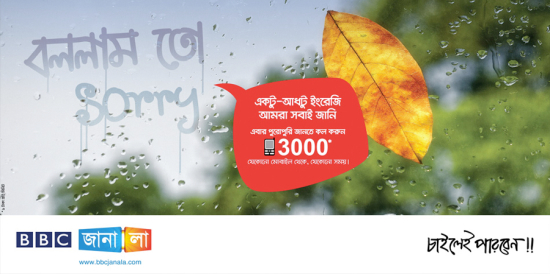Learning British English – for the cost of a cup of Bangladesh tea

.
One interesting use of mobile phones in education in developing countries can be found in Bangladesh, where the BBC World Service Trust and BBC Learning English are implementing the Janala project, an initiative that is providing English language lessons to citizens via their mobile phones as part of the wider English in Action program in Bangladesh, funded by the UK’s Department for International Development (UKaid).
Some of people involved with the Janala project recently shared some information about what they have been doing — and learning — as part of a discussion series at USAID around ‘mobile education’ topics (the other project presented in the latest session was the MILLEE project, which has been profiled on this blog before). I was fortunate enough to be be able to sit in on the presentation, at the kind invitation of USAID educational technology team, and thought I’d share some brief highlights:
-
What it is.
BBC Janala allows Bangladeshis to access short (2-3 minute) audio lessons through a simple voice call by calling a four digit shortcode. (Over 140 bilingual audio lessons are currently available.) While it is still in its early stages, the service appears to have found an audience: To date over two million audio lessons have been accessed (listened to), 177,000 short audio have been taken and stories and feedback recorded. In addition, over 100,000 audio lessons have been downloaded from BBC Janala mobile internet site (some observers consider this rather remarkable, given the difficulties for many to access the mobile internet and the fact that it has not been advertised). 46% of first-time users have returned to the service — this is also noteworthy, given that mobile value-added services in Bangladesh typically have only a 5% repeat rate. -
Costs to users
Through a special agreement, facilitated in part by coordination with the telecom regulator BTRC, all six operators have agreed to charge the same (reduced) tariffs for voice and SMS traffic to BBC Janala. The result has been a 50% reduction in the standard value-added service voice and SMS rates, which means that individual calls cost users a little less than a cup of tea. -
Research
The rollout of BBC Janala was preceded by a great deal of market and user research, and this research interest continues. One example of the type of research that is being conducted: 40 ‘incentivized’ users are being closely tracked and studied, to get a qualitative sense of the user experience and relevance of the BBC Janala offering over time. The ‘incentive’ here does not involve paying any participants; rather, air time costs associated with the use of BBC Janala are reimbursed. The idea here is to ‘take cost out of the equation’ in order to better understand the value for mobile education products and services themselves. One (very preliminary) early finding from related survey work is a suggestion that women are particularly interested in learning by mobile (especially given its “any time, any place” nature).
There are many potential ways that mobile phones can be used as learning tools; BBC Janala represents just one of them. (For example, some readers of this blog may be familiar with the MobilEdu and Nokia Life Tools English language mobile learning offerings in China and India, respectively.) It will interesting to see how such efforts evolve over time, as part of a larger investigation into how one increasingly ubiquitous ICT device — the mobile phone — may become increasingly relevant to learners around the world, in various ways and contexts.
This article was original published on EduTech, the World Bank blog on ICT and education, as Learning the Queen’s English … on your mobile phone? It is reprinted here by permission of the author.
Additional Links
Here are other mEducation Initiatives covered on EduTech, the World Bank Blog on ICT use in Education:
- Mobile Phones and Literacy in Rural Communities
- A (digital) library … in your pocket?
- What do we know about using mobile phones in education?
.

Congratulations to Janala! They've been named a 2010 Tech Laureate by the Tech Awards in the education category, and have a great promo in the Huffington Post:<img src="/wp-content/uploads/2010/09/janala.jpg">Back in 2006, I was a Tech Award Laureate as well.
Completely understand what your stance in this matter. Regardless that I might disagree on among the finer particulars, I feel you do an superior work explaining it. Certain beats having to investigation it on my own. Many thanks
its a wonderful initiative! What particularly caught my eye was the '46% of first-time users have returned to the service', which is absolutely amazing for a project of this nature. Would love to be part of such projects especially if there is any in Pakistan…there is always so much to learn and share!
I am particularly impressed that uses of Janala are paying for this service. That shows that users do find it of real value and suggests that it could be scaled up in Bangladesh and rolled out to other countries on a cost-neutral or even profit generating price point.